Fiberglass Reinforced Plastic (FRP) Engineering for Piping Systems
Self-paced or Virtual
8 modules
Edwin Schimmel, MSc
SPC121
Format:
On-demand
€640 For Teams
Get a 20% discount on all courses for you and your team.
Free Course Preview
Help yourself with your purchasing decision. Watch free content now.
Selected format
Self-paced
learn at your own convenience
e-Hybrid for teams
Self-paced modules + instructor sessions
Course Objective
"To give engineers involved with the design of FRP piping systems a complete understanding of FRP material properties and the associated engineering process."
Learn from home
100% online training
Video Lectures by Experts
watch multiple times
Start immediately
1-year unlimited access
PDH Hours qualified course
Read more here
About the course
Self-paced
8 modules
9.5 hours
English
1-yr access
SPC121
Fiberglass Reinforced Plastic (FRP) piping, also called Glass Reinforced Plastic (GRP) piping, is a cost-effective alternative to corrosion prone metallic piping and non-reinforced thermoplastics. However, the design of FRP systems requires specific knowledge as there are fundamental differences compared to the design of steel piping.
This course teaches you all the fundamentals required to design and work with FRP piping systems. After this course you have a solid understanding of the material properties and behavior for piping systems and you understand how this impacts designs. The engineering process is demonstrated, including pipe stress analysis. Also, a multitude of real-life field examples are discussed that illustrate critical aspects of FRP systems. In this course a great deal of attention is given to practical aspects of engineering FRP systems.
The course consists of 8 online modules based on video content. You receive 1-year unlimited access to the course and the discussions forum. This allows you to perform modules again when you need to refresh knowledge for your work projects.
Meet your instructor
Program & Details
Welcome & Your instructors
Content Overview
How to use this course
Questions Forum
FRP Materials and manufacturing
Material specifications of FRP
Manufacturing methods of GRP
GRP Application
Material limitations
Market range
Applications of GRP
A sample of the first module is available for free, so you can learn more about the teaching style and understand if the course fits your needs.
FRP Material properties
Bi-axial materials
Steel versus FRP
Short-term and long-term strenght
Qualification
GRP qualification tests
GRP codes
Overview of GRP codes
Philosophies in GRP standards
Piping code ISO 14692
Stress analysis of FRP systems
Pipe stress analysis
Constructing a stress envelope
Reducing material stress
Surge analysis and flange assessment
Surge analysis for FRP piping
Flange assessment
Buried FRP Piping
Pipe stress analysis
Ring strenght calculations
Material failure theories
GRP material strenght
Failure criteria
Ultimate Elastic Wall Stress
Material qualification
Full qualifiation
Regression
1000 hrs survival test
FRP failure
Longitudinal vs. circumferential cracks
Joint strenght and failure in FRP
Joint strenght and failure
Flange failure
Failure due to design errors
Failure miscellaneous
Introduction to Fiberglass engineering
Introduction to Modeling Session
Agenda to Fiberglass engineering
Configuration editor in Caesar II
Special execution Parameters
Pipe vendor Engineering Guide Data
Material Properties Input
Pipe vendor Engineering Guide Proces
Pipe Stiffness Parameter Input
Stress Envelope Parameter Input
Pipe vendor input Hydrostatic Design Stress
Long-term Axial and Hoop Strength input
Modeling of Fittings
Pipe Support Span
Load case Set-up in ISO 14692
Interpretation of Results
Flange Check in Caesar II
Euler buckling for Aboveground Pipes
Shell Buckling
Course evaluation survey
Your Personal Certificate
Related resources
Results
After this course, you...
have a fundamental understanding of the material and its behavior,
are familiar with the design of FRP pipes and joints,
know methods for manufacturing of fiberglass products and their (dis)advantages,
understand the qualification process for FRP products as per the ISO 14692,
have a solid understanding of the design process and stress analysis of FRP systems.
know the differences between steel and FRP and how this impacts pipe stress analysis,
have seen and discussed a multitude of real-life failures, common issues and mitigation measures.
Who should attend this course
Professionals involved with the design and realization of Fiberglass Reinforced Plastic piping systems,
Pipe stress engineers that work with FRP systems,
People that have experience with steel piping systems and get involved with FRP systems.
Prerequisites:
No experience with FRP is required,
Basic understanding of (steel) piping systems is beneficial.
Level: Advanced
Access to the course.
After your purchase is confirmed it will be activated to your account on the EngineeringTrainer learning portal. Here you will find the course in your dashboard and you will be guided step-by-step through the different course modules. You receive 1-year unlimited access to the course. This allows you to perform modules again when you need to refresh knowledge for your work projects.
Learn by doing.
The course is mainly based on video content: video lectures and video software demonstrations. English subtitles are available and videos can be viewed as many times as desired. The video lectures help you to grasp the important technical concepts.
This course is self-paced and is not subject to specific dates. The course contains 7 modules with a total of 8:36 hours of content which can be performed at your own pace. A Personal Certificate will be provided to participants if they finish the course within the first month after purchase. This incentive will motivate you to perform the course quickly thereby improving your learning curve.
You receive 1-year unlimited access to all modules. This allows you to perform modules again when you need to refresh knowledge for your work projects.
Participants of this course receive a personal digital certificate if they meet the following requirements:
completion of each module of the course,
filling in the Course Evaluation Survey.
Example Certificate:
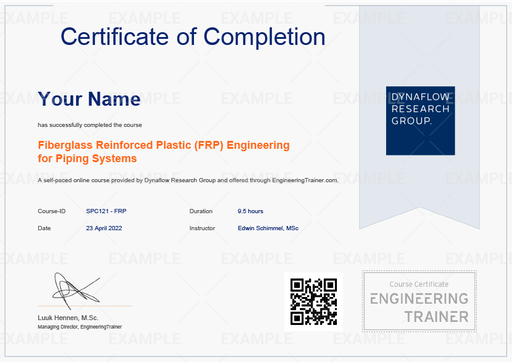
FAQ
Video lectures
Video demonstrations
Discussions forum with other participants & instructor
The majority of training material are videos. These are not available for download, but can be accessed directly with your account on the portal.
You receive 1-year unlimited access to the course. This allows you to perform modules again when you need to refresh knowledge for your work projects.
We encourage participants to submit feedback and questions in the Discussions Forum of the course. These are either answered directly in the forum or form the basis for new videos that are added to the online course on a regular basis.
Participants receive 1-year unlimited access to the course including new videos that are added during this year. Participants receive an email notification upon addition of new course videos.
No technical software is used in this course.
If your computer and internet connection is able to play videos online (YouTube) you will be able to follow the course. Note that almost all browsers are supported, except for Internet Explorer.
Yes, this course qualifies for PDH hours as per the NCEES CPC Guidelines.
Selected course format
Self-paced
€ 800
/ user- Self-learning modules
- Online discussion forum
- Live sessions with instructor
- 1-year access
- For individual learning
e-Hybrid
€ 1125
/ user- Self-learning modules
- Online discussion forum
- Live sessions with instructor
- 1-year access
- For teams (min. 4)
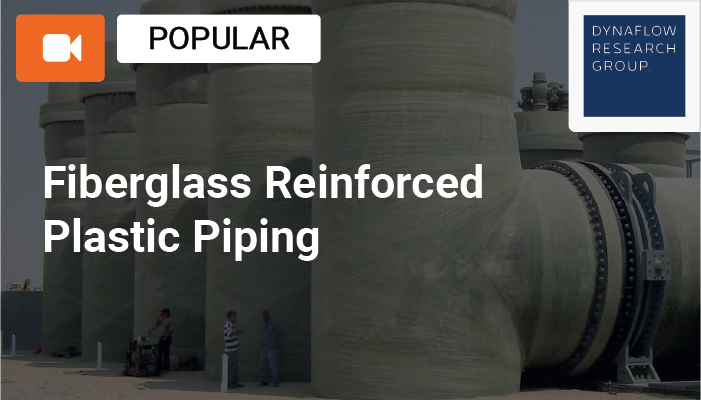
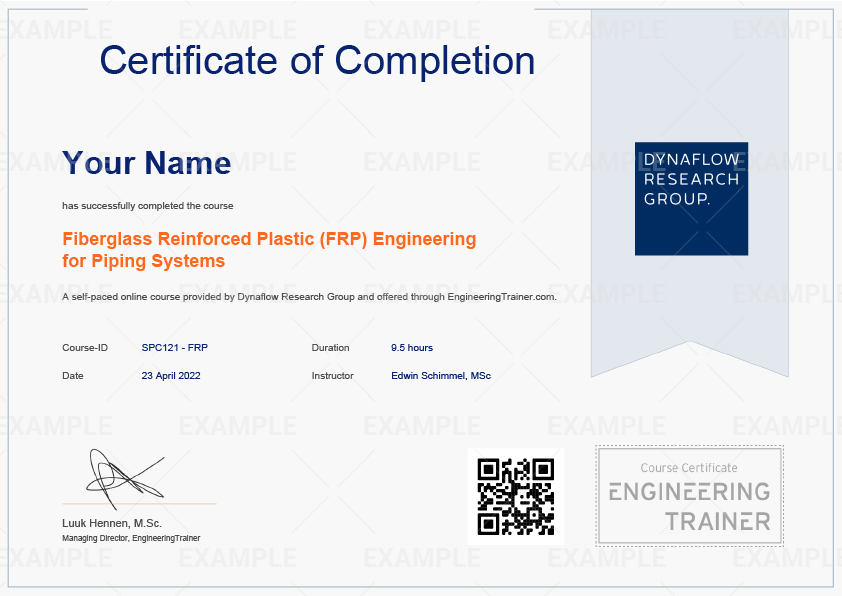


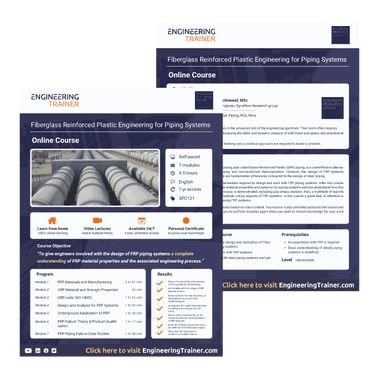


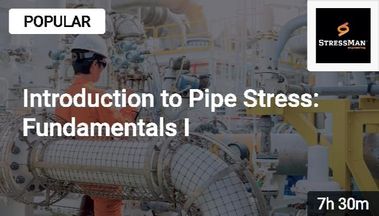
![[SPC122] Fiberglass Engineering for Piping Systems: an introduction](/web/image/219545/SPC122.png?access_token=4c811279-8630-4862-a793-0a9e64a08898)
![[SPC185] Pipe Modeling and Marking with ISOtracer](/web/image/223740/SPC1002.jpg?access_token=90bb5de7-986e-45f6-bd70-c7ee5141cb7d)
![[SPC95] Pipe Stress Fundamentals](/web/image/223741/SPC013.jpg?access_token=fefc3314-a7ac-43ec-8898-0d5302c883f1)
